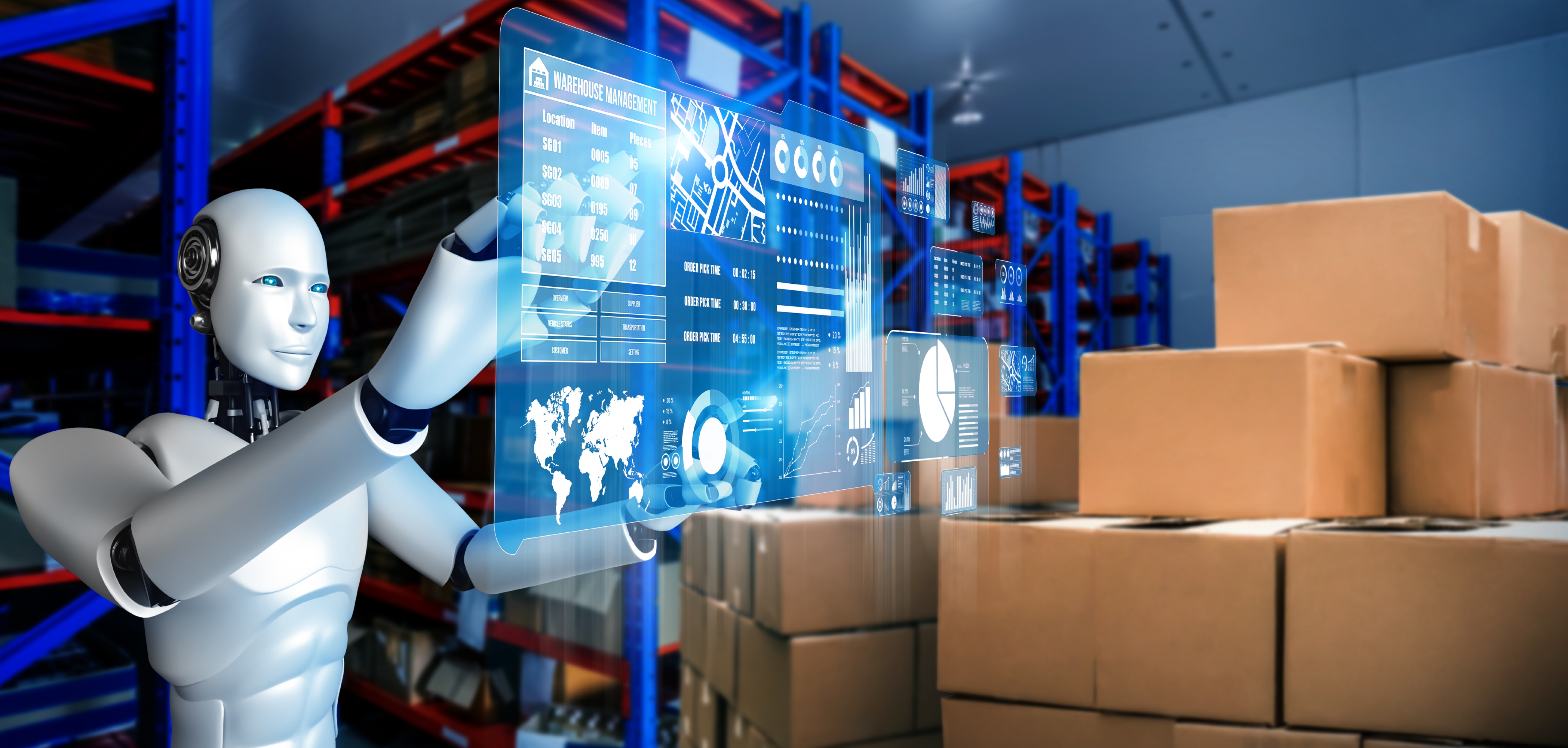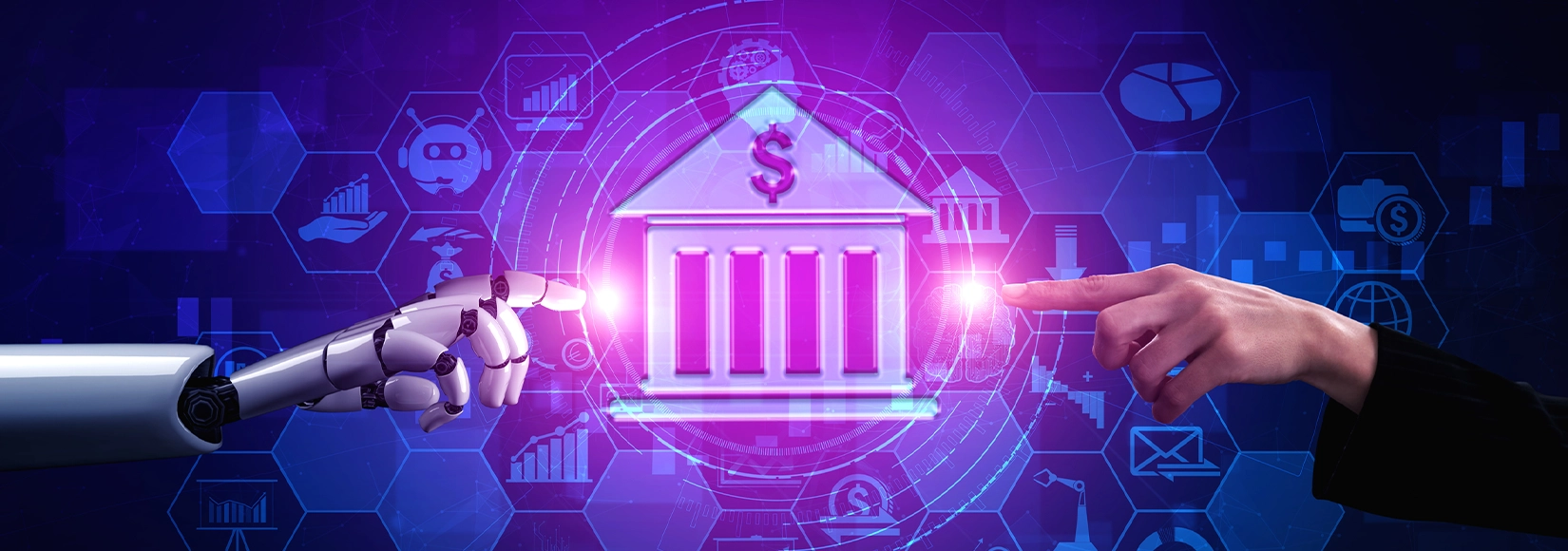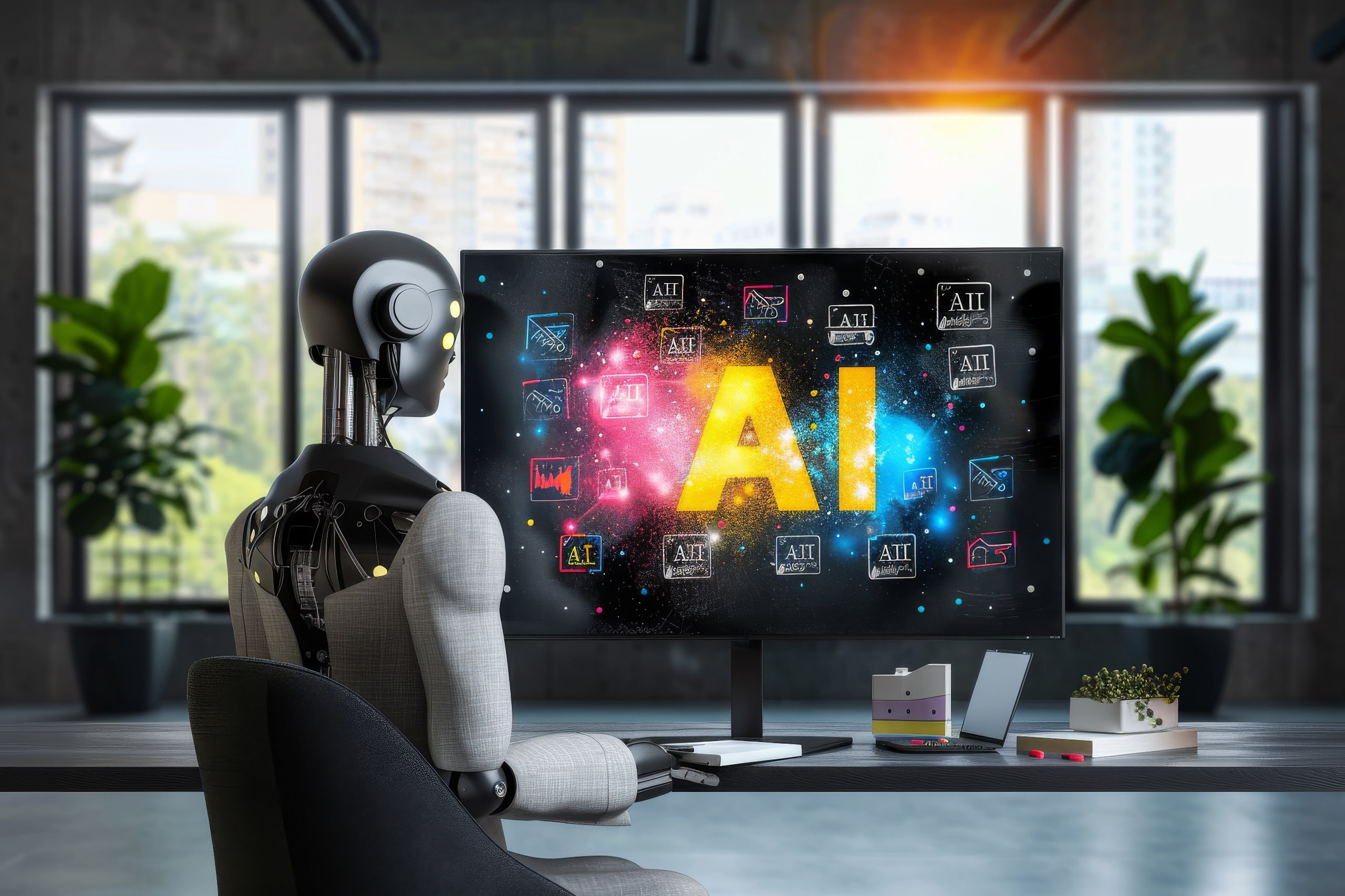A McKinsey Report stated that AI will build an entirely new “logistics paradigm” by 2030. It is no surprise that AI has revolutionized the way we live and interact with technology, and AI-driven automation, forecasting, and predictive analysis have boosted operations across various domains like healthcare, education, supply chain, marketing, etc, and have turned them faster, more efficient, and more accurate.
In this article, we will explore how artificial intelligence is bringing its transformations into transportation and logistics.
Traditional vs. Modern Logistics Solutions
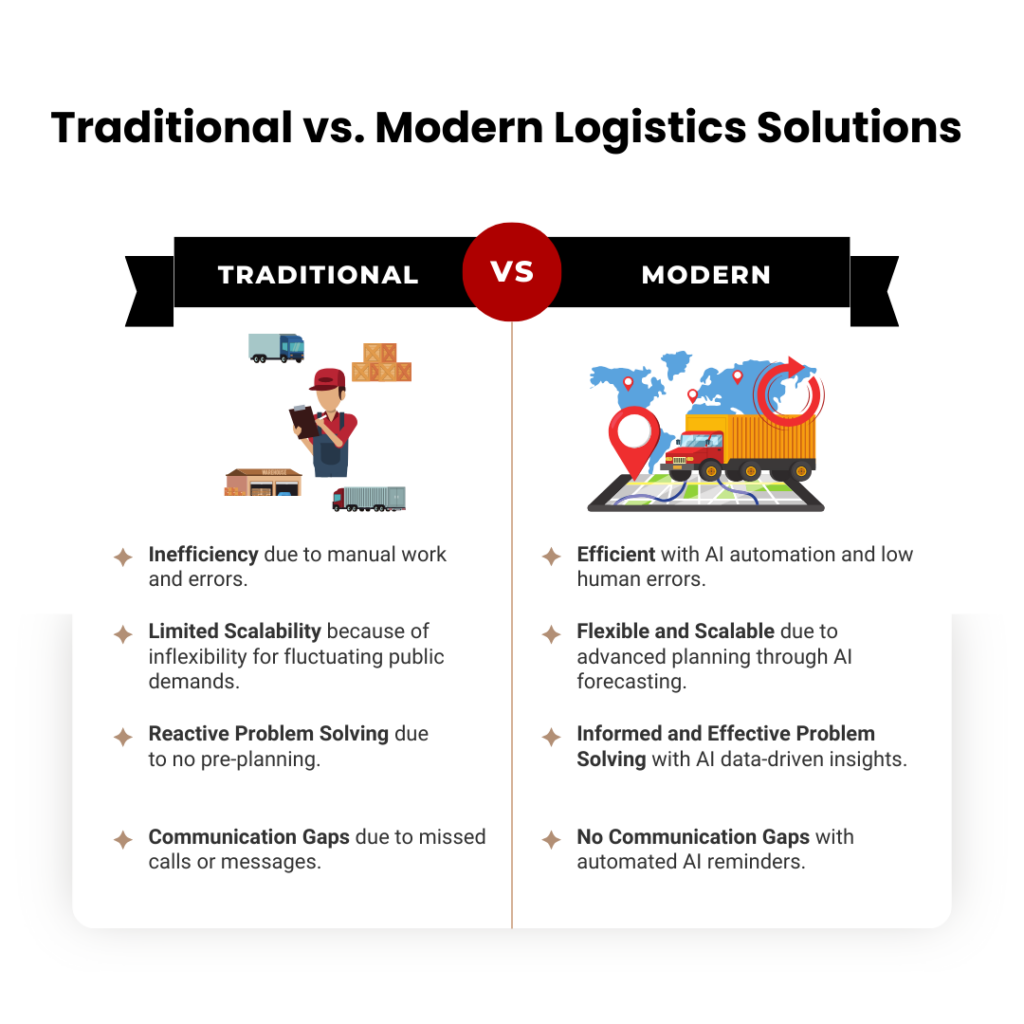
Traditional Logistics Solutions:
- Inefficiency due to manual work and errors.
- Limited Scalability because of inflexibility for fluctuating public demands.
- Reactive Problem Solving due to no pre-planning.
- Communication Gaps due to missed calls or messages.
Modern Logistics Solutions:
- Efficient with AI automation and low human errors.
- Flexible and Scalable due to advanced planning through AI forecasting.
- Informed and Effective Problem Solving with AI data-driven insights.
- No Communication Gaps with automated AI reminders.
Problems With The Conventional Way
Before diving deep, let us first understand how processes in logistics, and transportation used to work.
Back in the day, transportation and logistics relied heavily on manual processes and guesswork. For instance, if a batch of goods is to be moved from Warehouse 1 to Warehouse 2. An executive from Warehouse A would pick up the phone and call the transportation handler, and then both of them together would figure out how much time it’d take to deliver the goods, how many trucks would be required, and when it should be dispatched. All the things would totally work on the guesswork; therefore, any disturbances like traffic, etc, can hinder the execution. It is like trying to get through a maze blindfolded.
Let’s break down the problems in the traditional logistics:
Inefficiency
Due to the inability to analyze large datasets manually, many trends and patterns are missed, and decisions are made on guesswork or outdated information, leading to inefficiency and inaccuracy.
Limited Scalability
As the demand is increasing, public demands tend to fluctuate a lot. Traditional methods of logistics and transportation are not as flexible and do not adapt to meet the needs of people, thereby limiting the scalability or expansions and resulting in bottlenecks or delays.
Reactive Problem Solving
Traditional logistics were not proactive in preventing issues before they came up, and this left the businesses with no choice but to tackle situations at the exact time they arose. This led to delays and added costs. For example, uncertain conditions like vehicle breakdowns, road closures, or unexpected weather conditions would have left the organization with no choice but to arrange alternatives, which would cost either time or money.
Communication Gaps
Missed messages, calls, and misunderstandings all lead to miscommunication that can result in delays in delivery, additional costs, misplaced items, and repeated efforts.
Now, the new methods of transportation and logistics powered by artificial intelligence have started bringing transformations. All these problems have been solved, and more exciting features and innovations are brought to the logistics systems.
The Role of AI in Transportation and Logistics
AI models get trained from large relevant datasets including the company’s data, their products, sales, customer details, target audience, and demands and supply data of their local markets around. Using all the data, the AI model forms actionable insights and predictions that can be used for various purposes by logistic business owners.
For a better understanding, let’s look at the below-given key points referring to how artificial intelligence has transformed transportation and logistics:
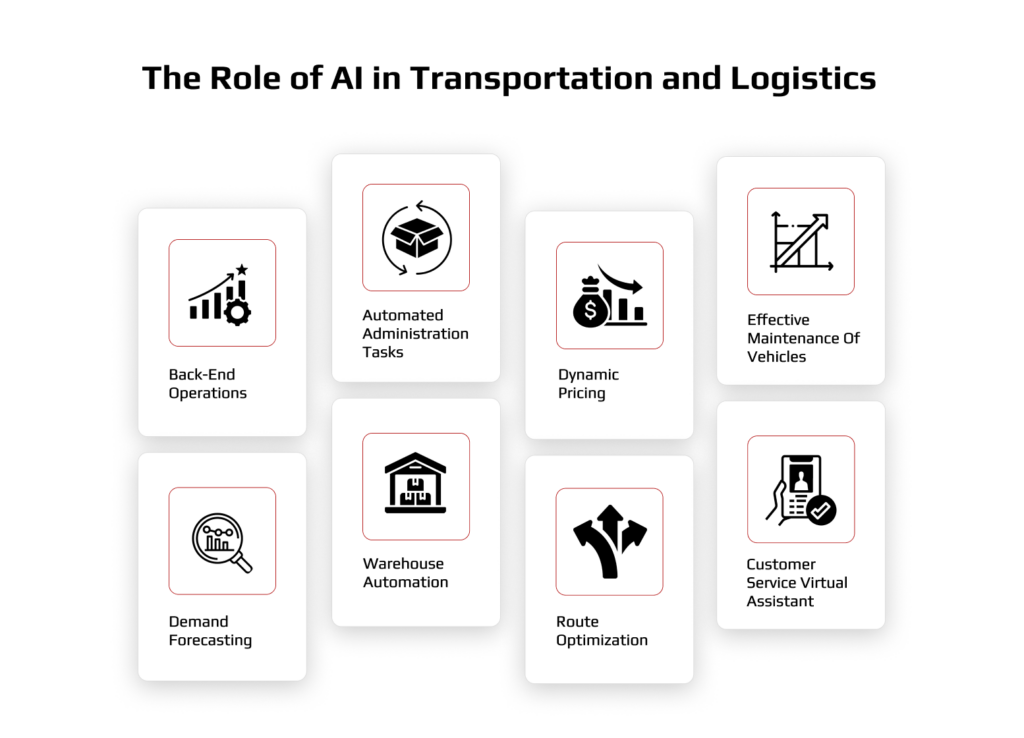
Demand Forecasting
By studying the real-time data on demand and supply, AI models can build predictions about the increasing demands in the future to enable the logistics organization to prepare for hefty situations like optimizing their processes and vehicles, raising their stock levels, preparing ways to cut cost or build effective marketing strategies to attract a large number of customers. Moreover, since forecasting is data-driven, the possibility of errors gets reduced, and accuracy gets increased. In this way, AI helps improve the quality of service, reduce costs, and avoid shortcomings like low stocks that dissatisfy the customers.
Route Optimization
By considering all the deliveries and conditions like traffic, weather, and demand, AI prepares routes of transportation that best suit the requirements of the organization and proves to be cost-effective for them. This reduces the pressure on transportation handlers and logistic managers and keeps the guesswork out of the picture. Moreover, data-backed predictions like the estimated duration of the trip, date of delivery, and automated schedule planning, including deadlines for packaging and dispatching, increase efficiency. Also, automated alerts about the status of orders can be sent to the customers, which increases their satisfaction and experience. Thus, AI not only optimizes routes but also increases efficiency and customer satisfaction and reduces manual work pressure on management.
Warehouse Automation
AI for inventory management has been widely used in today’s era. Barcodes are pasted on products and packages that encode all the details of the product, like their name, unique ID, place of manufacture, etc, and they are used to track the products and packages as they move with the facility. Moreover, the warehouse has sensors that scan those barcodes as they move in and out of the warehouse. This method of inventory and warehouse management also helps in maintaining AI-driven automated records, enabling the executives to keep an easy and accurate check on products and stocks, which ensures that the organization never runs out of stock or overbuys.
Back-End Operations
Artificial intelligence turns most of the manual tasks automated, like record keeping, scheduling, planning, inventory management, report generation, email processing, and much more. AI systems automatically schedule the tasks, a lot of cargo and trucks, plan their routes, manage employees, and track packages. It also takes automated orders and generates reports to inform managers with the help of robotic process automation. Thus, AI handles all the back-end operations efficiently.
Effective Maintenance Of Vehicles
Just like products, artificial intelligence also keeps a check on cargo and trucks and keeps a record of its information, including maintenance records. It automatically sends maintenance reminders to the concerned official. It helps the company keep all their vehicles and assets and get their maintenance services done in a timely manner, which increases their life and reduces costs that may be spent on sudden vehicle damage due to rigorous working. This way, AI makes transportation safer, more efficient, and more sustainable.
Dynamic Pricing
AI keeps records of the company’s products and handles the company’s websites and applications solely without the need for manual intervention. One of the most innovative and amazing features of AI is dynamic pricing. This refers to the technique of AI to adjust product prices in accordance with real-time demand and supply trends. For instance, if the demand is high, it will increase the product prices to earn more profits, and if the demand is less, it will reduce the product prices to attract more customers.
Automated Administration Tasks
By automating most of the manual tasks, artificial intelligence reduces pressure on management and administration and thus increases the efficiency and accuracy of the company. Thus by saving manager’s time and resources, AI enables them to focus on more strategic tasks that boost the return on investments, and sales of the company.
Customer Service Virtual Assistant
Natural language processing-powered conversational chatbots or voice assistants can conversate with the stakeholders and solve their queries; for example, if the customer is complaining about the delay in their order, the AI bot will try to solve the issue in real-time on its end or report it to the concerned official in case it is complex. This helps in providing quick solutions to the customers, enhancing their customer experience, and narrowing down the requests for the customer executives.
Hence, AI has drastically transformed logistics and transportation and brought amazing features for improving operational efficiency and enhancing the customer experience.
Use cases of AI in logistics for businesses.
AI can be quite helpful in making logistics operations smooth. Following are the use cases of AI in logistics for businesses:
Identifying Challenges
Before integrating AI, an audit is a must to note down your low points or areas of improvement, which can be made efficient with the help of the AI algorithm. Moreover, after the AI gets incorporated into the company’s system, it will produce data-driven insights and highlight the areas that need betterment. Thus, AI helps business managers to recognize where they are lacking and make it efficient.
Compare & Choose
AI helps you by providing options that fit your needs differently, and enable you to choose the plan that best fits your requirements and budget. For example, if you are looking to transport a load of goods from one location to another, AI can form insights on the budget estimated time required depending on different modes of transport like train, truck, airplane, etc.
Training Staff
With the help of AI, you can prepare modules to upskill your faculty from time to time. To grow your business, it is important to move with the advancing technology and train your team to utilize the best technological and AI-driven equipment. Personality development, communication, IT upskilling, and marketing are some of the areas where AI can provide improvement. All this is important for the smooth and efficient working of the company.
Benefits of AI in Transportation Logistics
The following are the advantages of implementing AI in transportation and logistics:
Cost Cuttings
As artificial intelligence helps in working efficiently, it helps in saving costs and identifying areas from where costs can be cut. For instance, by optimizing routes, AI helps save fuel costs. Moreover, by keeping a check on vehicle maintenance, AI avoids any unexpected wear or tear, increases the vehicle’s efficiency, and increases its lifespan.
More Accuracy
Data sets the root of artificial intelligence; therefore, any action or decision it makes is purely based on the data and the underlying trends, and no randomness or guesswork is involved. This helps in more accurate predictions, planning, and decision-making. For instance, AI-produced delivery time estimates would definitely be more accurate than the human made ones.
Improved Security
All the products in the inventory, supply, and trucks get tracked in real-time; this ensures the security of goods and avoids misplacements or mishappenings. This improved the security of products and transportation vehicles.
Better Customer Service
With AI incorporated into the communication systems of the company, all the customer queries and requests are responded to at the right second. This ensures that no customer orders and requests get missed. This improves the quality of service of the company, reduces pressure on the administration and customer support team, and enhances the customer experience.
Challenges of AI in Transportation Logistics
AI integration and utilization are easy and effective, but there are certain challenges that stand in the way of its incorporation, which need to be handled for successfully integrating AI into the company’s systems.
Expenditure
To transform the company’s operations, infrastructure, and IT network might have to be upgraded to integrate AI algorithms. This might lead to hefty expenditure, but one sure thing is that all the expenditure would be worth it, and there would be a high return on investment (ROI). Moreover, a proper audit of company’s infrastructure before AI integration is important to ensure the AI model’s compatibility with the IT systems.
Ethical Concerns & Data Privacy
As AI algorithms get trained from customer personal data, and company’s sensitive details, it is important to ensure the responsible use of AI technologies. The company’s manager should make sure of strict compliance with laws and regulations to avoid data or security breaches; failing to do so can lead to scams and fraud with the customers.
Data Availability
Training of AI models with large high-quality relevant data sets is quite important for AI algorithms to function accurately and efficiently. However, the availability of large high-quality data sets is a hurdle because most of the data available would be of low quality with incorrect values or missing information. To tackle this, the business must invest in data cleaning and validation which will turn up the quality of data.
Chain Sight: BuildFuture AI’s Solution for Transportation, Logistics & Supply Chain
Chain Sight is a cutting-edge, AI-enhanced solution for transportation and supply chain enhancement, designed to refine supply chain networks. It achieves this through advanced prediction, optimization, and management techniques. Specifically, it enhances logistics and supply operations, streamlines and automates processes in warehouse management, and improves the accuracy of demand forecasting.
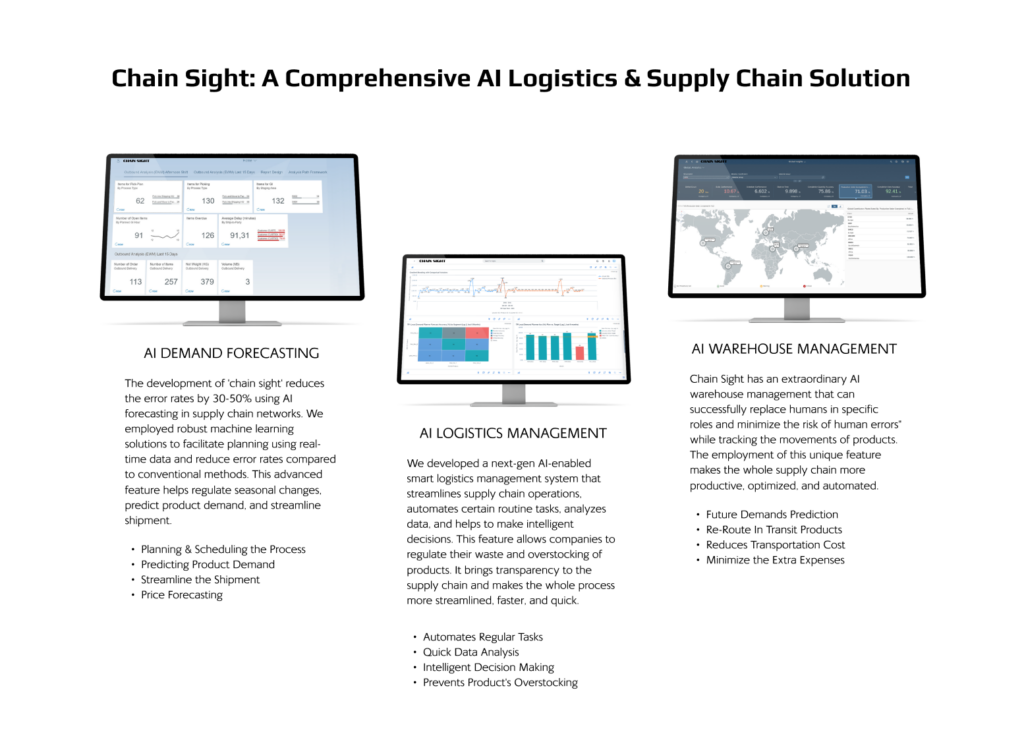
Future of AI in Transportation Logistics
The future of AI in logistics will have AI taking over most of the operations of the logistics operations. AI would play a crucial role in taking many important decisions like deciding the mode of transportation, forming discount deals, managing employees, collaborations, and much more.
Apart from this, the warehouse robots seem to be a sure-shot future-ready solution that would be able to handle most of the tasks like loading the goods, unloading, scanning QR codes of products, etc.
Hence, incorporating AI into the transportation and logistic systems is no longer a choice but a need that logistics firms or businesses would need to take care of whether they do it today or tomorrow.
If you are looking for top-notch AI solutions for your business, do reach out to Build Future AI via email at business@buildfuture.ai. Our expert R&D and development teams, collaboratively understand your needs and bring innovative solutions to build future-ready solutions for your business.

